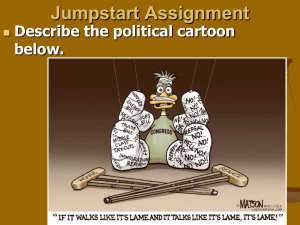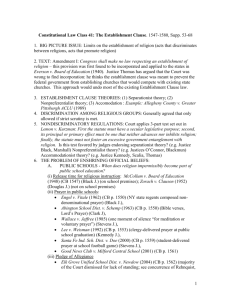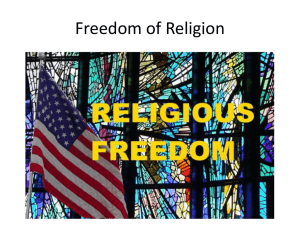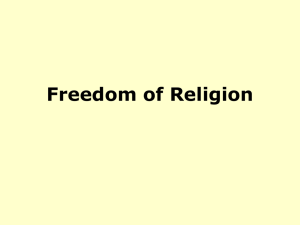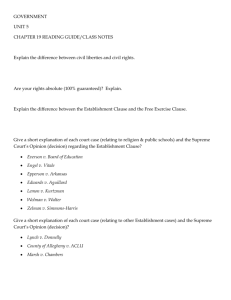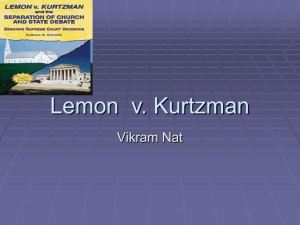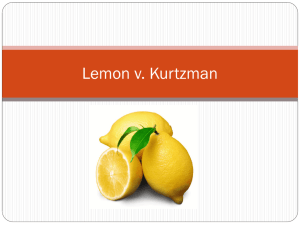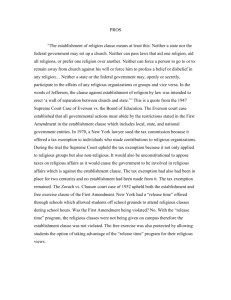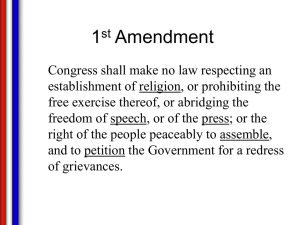1st Amendment
advertisement
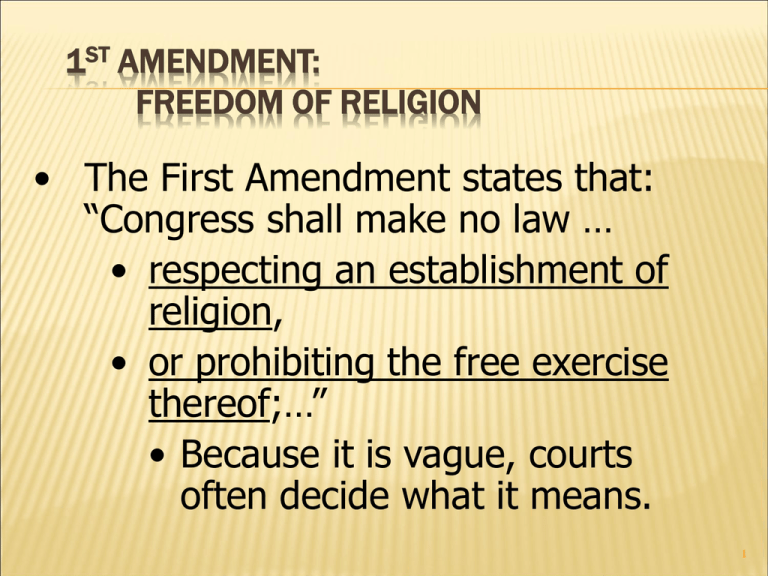
1ST AMENDMENT: FREEDOM OF RELIGION • The First Amendment states that: “Congress shall make no law … • respecting an establishment of religion, • or prohibiting the free exercise thereof;…” • Because it is vague, courts often decide what it means. 1 MANY EXAMPLES OF RELIGIOUS TYRANNY IN HISTORY – TOO NUMEROUS TO COUNT Religious oppression fills earth’s history. In Rome 300 AD you could be executed for practicing Christianity; in year 400 AD you could be executed for NOT practicing Christianity. America created by religious tyranny in 1600s – English Christian Puritans in New England & Spanish Catholics in New Mexico typical totalitarians who executed non believers. Regarding our discussion of freedoms of religion, speech and press, further consider that there are radicals who hate, often based on religion, who if they had the power would take our society into the dark ages to censor opposition with disastrous consequences. Too many are violent and vehemently opposed to any religion different than their own and they are misguided like some others in other religions around the world. See the map on this link and select any state to view them. http://www.splcenter.org/get-informed/hate-map On the drop down the menu, select any state, to see a list of hate groups and you will see that many are “Christian.” The problem is not just with those who badly interpret Islam. A serious problem occurs when religious illiterate extremist criminals, who badly interpret any religion, whether Christian or Islam or any other, are permitted to have power that it exerts over others in society. In the USA the constitution marginalizes such individuals/groups lthough they still are a dangerous menace to civilized society. Other countries will have to find a way to do the same for the well-being of the world. 2 2/6/2005 WHAT IF HAD AN ESTABLISHED RELIGION? Government would create and support an official state church…often tax dollars support that chosen church. that church’s laws become the law of the land. Khamenei, the supreme leader of Iran reminded Iranians that he is the spokesperson of God's design and must not be defied. Thus how can ever be wrong? Way to control population. Iran’s Khatami asked the judiciary to “without mercy punish leaders of (Iranian student) protests & those supported by US & Israel. I remind all that Khamenei, the supreme leader, rules by God & must not be defied.” the nation’s leader, often heading the church, usually appoint the leading “official” government approved religious clerics. often other religions are excluded. Iranian student friend. 3 2/6/2005 DRAFTING THE FIRST AMENDMENT Authors asked, “should government establish a religion or not?” Thomas Jefferson wrote that there should be “a wall of separation between church and state.” Why? Because he was opposed to the Church of England being the official state supported religion. 4 2/6/2005 THE ESTABLISHMENT CLAUSE The Establishment Clause of the First Amendment guarantees that the government will not create and/or support an official state religion – that is prefer one over the other. Some want their religion to be the preferred religion by government, & want government to force or coerce all citizens to practice their “right” religion - but the Constitution is there to stop them – to keep the government neutral. Why? Because many on earth disagree with your religious beliefs. Remember individual liberty vs group think? Shouldn’t there be places where an individual can be free of “others” views about religion? 5 2/6/2005 THE SUPREME COURT AND THE ESTABLISHMENT CLAUSE •The Supreme Court has ruled that official lead prayer and bible reading (religious services) in government schools are a unconstitutional violation of separation of church & state. •Remember, the constitution protects you from government, thus, private schools are exempt from restrictions. 6 2/6/2005 ESTABLISHMENT CLAUSE The Court prohibits organized Bible reading and prayer in public schools because why? pressure to conform can cause one to think less of another who believes differently And is either a direct or indirect coercion on minority. Youth are impressionable. 7 ENGEL V. VITALE 1962 2/6/2005 • Brought by parents of public school students in New York who complained the prayer to "Almighty God" contradicted their religious beliefs. •Prayer in question was: "Almighty God, we acknowledge our dependence upon Thee, and we beg Thy blessings upon us, our parents, our teachers and our country. Amen.“ •Plaintiffs argued that opening the school day with such a prayer (even if students are not required to recite it) violates the Establishment Clause of the First Amendment to the United States Constitution (as applied to the states through the Fourteenth), which says, "Congress shall make no law respecting an establishment of religion.“ •The court decided that government-directed prayer in public schools was an unconstitutional violation of the Establishment Clause. This was decided in a vote of 6-1. Prayer is a religious activity by the very nature of it being a prayer. Requiring such a religious activity for government school children violates the Establishment Clause. 8 2/6/2005 ABINGTON ISD, PENN V. SCHEMPP & MURRAY V. CURLETT (1963) Cases dealt with state-approved reading of Bible passages before classes in public schools. Schempp, a relgious family, challenged a Pennsylvania law which stated that: “...at least ten verses from the Holy Bible shall be read, without comment, at the opening of each public school day. Any child shall be excused from such Bible reading, or attending such Bible reading, upon written request of his parent or guardian. This was disallowed by a federal district court. Murray, an atheist, (later O'Hair), represented her sons, William and Garth. Murray challenged a Baltimore statute that provided for the "reading, without comment, of a chapter of the Holy Bible and/or of the Lord's Prayer" before the start of classes. Teachers could be fired for refusing to participate, and pupils segregated from others if they did not join in the daily reading. In 1963, the Supreme Court ruled 8-1 against of allowing the reciting of the Bible verses and the Lord's Prayer. The Constitution forbids any establishment of religion, that prayer in government is a form of religion, and that hence state-sponsored or mandated prayer in public schools cannot be allowed. 9 2/6/2005 ESTABLISHMENT CLAUSE Marsh v. Chambers 1983. Open gov’t meetings w/prayer ok since it is only a “tolerable acknowledgement of beliefs.” Read this article to learn about the problem of prayers in the Texas Legislature led by clergy that are too partisan and too religious advocating particular policy http://pushjunction.com/l/15808 If anyone files a complaint in federal court there will be trouble for Texas taxpayers. Note how many Christian clergy and non Christian have been invited by the conservative Republican legislature to give these prayers. 10 2/6/2005 LEMON V. KURTZMAN In 1971, Lemon v. Kurtzman, the Court ruled that New York state could not use state funds to pay parochial school teachers’ salaries. To be Constitutional the challenged practice must: 1. have a secular purpose. 2. neither advance nor inhibit religion. 3. not foster excessive government entanglement with religion. In 1980, in Stone v. Graham, this Lemon Test was used to invalidate a Kentucky law that required the posting of the Ten Commandments in public school classrooms because “it is a religious exercise.” 11 2/6/2005 “SEE YOU AT THE POLE” Student participation before - or after – government school events, such as “see you at the pole,” is permissible. Government school officials, acting in an official capacity, may neither discourage nor encourage participation in such an event. 12 2/6/2005 THE FREE EXERCISE CLAUSE “Congress shall make no law.....prohibiting the free exercise thereof (religion)” is designed to prevent the government from interfering with the practice of religion. This freedom is not absolute. Some religious practices have been ruled illegal. Nonetheless, the Court has made it clear that the government must remain NEUTRAL toward religion. Gov’t cannot attack religious practices it disagrees with, or church leaders it opposes – unless when religious practice injures or conspires to injure others – violating the law. 13 2/6/2005 FREE EXERCISE CLAUSE Freedom to believe is greater than the freedom to act. Do anything you want as long as no harm to others. Therefore, we do have laws restricting some “religious practices.” Right wing snake handler religion regulated. Woods Cove Holiness Church, Alabama 2006 woman killed at East London Holiness Church in London, Kentucky (“sign of a true believer is power to pick up serpents & not be harmed” – so says the Bible). 14 FREE EXERCISE CLAUSE 2/6/2005 • State cannot force a person to fight in war against religious beliefs. • Native American Church & prohibited drugs. 15 2/6/2005 FREE EXERCISE CLAUSE 2/13/01: Rev. Dixon arrested & church seized by US Marshals for nonpayment of $6 million in taxes. Could have avoided by filing “nonprofit religious status” form but refused due to anti government stance. Called “free church” movement. Churches do not operate independent of law. 16 2/6/2005 ELK GROVE UNIFIED SCHOOL DISTRICT V. NEWDOW, 2004 PLEDGE OF ALLEGIANCE Pledge written 1892 by Baptist minister Francis Bellamy, who made no reference to religion in his version: "I pledge allegiance to my flag and the republic for which it stands, one nation, indivisible, with liberty and justice for all." Became a part of public school programs. In 1954, Congress added "under God," after pressure by Catholics. Newdow is atheist who didn’t want 3rd grade daughter reciting the religious part and sued, even though legally it is voluntary only, Newdow argued that there is indirect coercion and a violation of separation. Students should not “feel” compelled by school officials to recite to show love of country. 9th circuit banned that part of pledge but the Supreme Court dismissed the case arguing that father had no “standing” to challenge the case, (he didn’t have to say the pledge). Thus, the SC invited someone who does have standing to file a new case. 17 2/6/2005 BOTTOM LINE OF ESTABLISHMENT & FREE EXERCISE CLAUSES Remember intent of Constitution authors – individual liberty – not forced group think! We have seen how some countries of the world are extremist religious totalitarian dictatorships where individuals & minority religions have NO rights, and are forced to practice government religious beliefs against their wishes. Iranian Muslim majority likes this because it is the majority and can get away with extreme oppression, but they hate it in other countries where they are the minority & they are discriminated against. Think about how some in America have similar scary views with potential horrific results. That is the point of tyranny of the majority and our constitution’s protection of the minority! In our free USA, one has NO legal right to impose his religious beliefs on you, or to use government to do so! In our free USA, one has NO legal right to use his religion as a fanatical intolerant spiritual weapon against those who disagree. Can you understand how this conservative republican lawyer to President Reagan feels when leaders in the US military criticize his military sons for being Jewish? Read this article & see website to understand. http://www.statesman.com/opinion/insight/guns-and-god-author-sees-network-ofhard-2388164.html website http://www.militaryreligiousfreedom.org/ 18
